Florida Student Charged With Creating Disturbance Over Pledge Of Allegiance
A student in Florida has been charged with creating a disturbance after declining to recite the Pledge Of Allegiance in class.
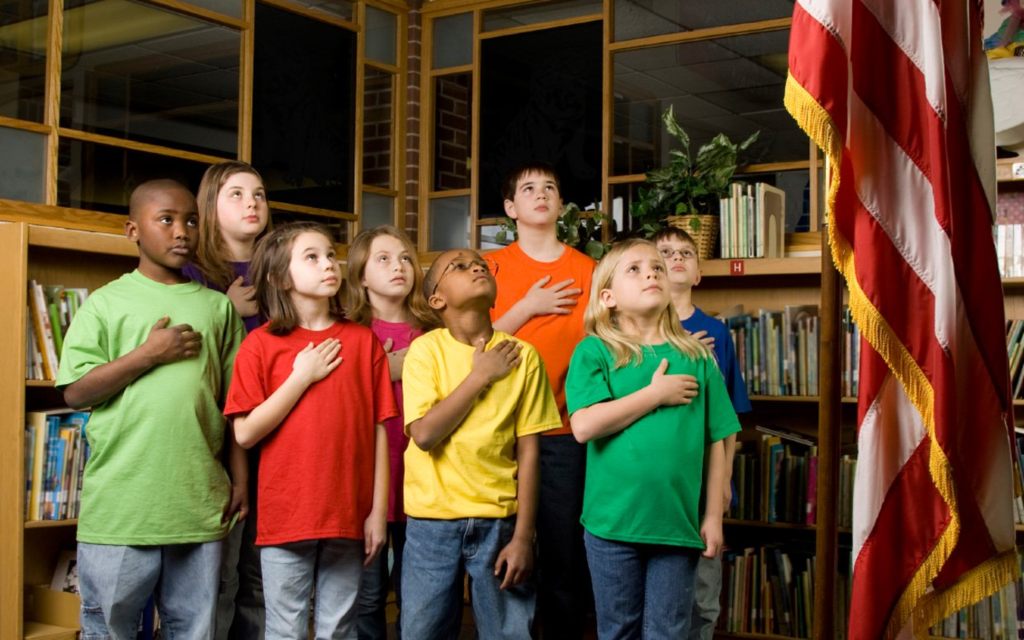
The Washington Post reports on a student in Florida being punished for not reciting the Pledge Of Allegiance
A Florida student is facing misdemeanor charges after a confrontation with his teacher that began with his refusal to recite the Pledge of Allegiance and escalated into what officials described as disruptive behavior.
The student, a sixth-grader at Lawton Chiles Middle Academy in Lakeland, Fla., east of Tampa, refused to stand for the pledge in the Feb. 4 incident, telling the teacher that he thinks the flag and the national anthem are “racist” against black people, according to an affidavit. The teacher then had what appeared to be a contentious exchange with the boy.
If living in the United States is “so bad,” why not go to another place to live? substitute teacher Ana Alvarez asked the student, according to a handwritten statement from her.
“They brought me here,” the boy replied.
Alvarez responded by saying, “Well you can always go back, because I came here from Cuba, and the day I feel I’m not welcome here anymore, I would find another place to live.” She then called the school office, as she did not want to keep dealing with the student, according to the statement.
Officials said the situation escalated. The student yelled at the administrative dean and a school resource officer with the Lakeland Police Department after they came to the classroom, accusing them of being racist and repeatedly refusing to leave the room.
“Suspend me! I don’t care. This school is racist,” the student, who is black, told the dean as he walked out of the classroom with his backpack, according to the affidavit.
According to a statement from the Lakeland Police Department, the boy then “created another disturbance and made threats while he was escorted to the office.” He was later charged by police with disruption of a school facility and resisting an officer without violence.
Lakeland police said in the news release that the student was not arrested for refusing to recite the Pledge of Allegiance. “This arrest was based on the student’s choice to disrupt the classroom, make threats and resisting the officer’s efforts to leave the classroom,” police said.
The American Civil Liberties Union of Florida issued a rebuke in the wake of the controversy. “This is outrageous. Students do not lose their First Amendment rights when they enter the schoolhouse gates,” the group said on Twitter. “This is a prime example of the over-policing of Black students in school.
“The 11-year-old boy’s mother, Dhakira Talbot, was not immediately available for comment Sunday. But she told Bay News 9 that the teacher was wrong and that the school overstepped its authority by punishing her son, who was taken to a juvenile detention center and suspended for three days after the incint.
“I’m upset, I’m angry. I’m hurt, more so for my son. My son has never been through anything like this,” Talbot told the TV station. “I feel like this should’ve been handled differently. If any disciplinary action should’ve been taken, it should’ve been with the school. He shouldn’t have been arrested.” Talbot said she thought the charges should be dropped and that the school should be held accountable for its handling of the situation.
(…)
In a statement Monday, Polk County Public Schools said the resource officer, not school officials, made the decision to arrest the student.
The school district said that students are not required to participate in reciting the pledge. In fact, the Supreme Court ruled in 1943 in West Virginia State Board of Education v. Barnette that schools cannot require students to salute the flag or recite the pledge, citing First Amendment rights.
But the substitute teacher was not aware that students are not required to recite the pledge, the school district said, adding that officials will look at improving training for substitute teachers and that Alvarez no longer works in the district.
The legal issues here couldn’t possibly be more clear, as a matter of fact, and stretch back 71 years to a Supreme Court decision that has served as the basis for most modern First Amendment law. In that case, West Virginia Board of Education v. Barnette, the Supreme Court dealt with sisters who were expelled from school for refusing to comply with a state law that required all students to recite the Pledge of Allegiance each day. In a 6-3 opinion, the Court ruled that the law was unconstitutional and that no student could be forced to recite the Pledge:
There is no doubt that, in connection with the pledges, the flag salute is a form of utterance. Symbolism is a primitive but effective way of communicating ideas. The use of an emblem or flag to symbolize some system, idea, institution, or personality, is a short cut from mind to mind. Causes and nations, political parties, lodges and ecclesiastical groups seek to knit the loyalty of their followings to a flag or banner, a color or design. The State announces rank, function, and authority through crowns and maces, uniforms and black robes; the church speaks through the Cross, the Crucifix, the altar and shrine, and clerical reiment. Symbols of State often convey political ideas just as religious symbols come to convey theological ones. Associated with many of these symbols are appropriate gestures of acceptance or respect: a salute, a bowed or bared head, a bended knee. A person gets from a symbol the meaning he puts into it, and what is one man’s comfort and inspiration is another’s jest and scorn.
Over a decade ago Chief Justice Hughes led this Court in holding that the display of a red flag as a symbol of opposition by peaceful and legal means to organized government was protected by the free speech guaranties of the Constitution. Stromberg v. California, 283 U.S. 359 , 51 S.Ct. 532, 73 A.L.R. 1484. Here it is the State that employs a flag as a symbol of adherence to government as presently organized. It requires the individual to communicate by word and sign his acceptance of the political ideas it thus bespeaks. Objection to this form of communication when coerced is an old one, well known to the framers of the Bill of Rights. 13
It is also to be noted that the compulsory flag salute and pledge requires affirmation of a belief and an attitude of mind. It is not clear whether the regulation contemplates that pupils forego any contrary convictions of their own and become unwilling converts to the prescribed ceremony or whether it will be acceptable if they simulate assent by words without belief and by a gesture barren of meaning. It is now a commonplace that censorship or suppression of expression of opinion is tolerated by our Constitution only when the expression presents a clear and present danger of action of a kind the State is empowered to prevent and punish. It would seem that involuntary affirmation could be commanded only on even more immediate and urgent grounds than silence. But here the power of compulsion is invoked without any allegation that remaining passive during a flag salute ritual creates a clear and present danger that would justify an effort even to muffle expression. To sustain the compulsory flag salute we are required to say that a Bill of Rights which guards the individual’s right to speak his own mind, left it open to public authorities to compel him to utter what is not in his mind.
Whether the First Amendment to the Constitution will permit officials to order observance of ritual of this nature does not depend upon whether as a voluntary exercise we would think it to be good, bad or merely innocuous. Any credo of nationalism is likely to include what some disapprove or to omit what others think essential, and to give off different overtones as it takes on different accents or interpretations. 14 If official power exists to coerce acceptance of any patriotic creed, what it shall contain cannot be decided by courts, but must be largely discretionary with the ordaining authority, whose power to prescribe would no doubt include power to amend. Hence validity of the asserted power to force an American citizen publicly to profess any statement of belief or to engage in any ceremony of assent to one presents questions of power that must be considered independently of any idea we may have as to the utility of the ceremony in question.
(…)
he very purpose of a Bill of Rights was to withdraw certain subjects from the vicissitudes of political controversy, to place them beyond the reach of majorities and officials and to establish them as legal principles to be applied by the courts. One’s right to life, liberty, and property, to free speech, a free press, freedom of worship and assembly, and other fundamental rights may not be submitted to vote; they depend on the outcome of no elections. [319 U.S. 624, 639] In weighing arguments of the parties it is important to distinguish between the due process clause of the Fourteenth Amendment as an instrument for transmitting the principles of the First Amendment and those cases in which it is applied for its own sake. The test of legislation which collides with the Fourteenth Amendment, because it also collides with the principles of the First, is much more definite than the test when only the Fourteenth is involved. Much of the vagueness of the due process clause disappears when the specific prohibitions of the First become its standard. The right of a State to regulate, for example, a public utility may well include, so far as the due process test is concerned, power to impose all of the restrictions which a legislature may have a ‘rational basis’ for adopting. But freedoms of speech and of press, of assembly, and of worship may not be infringed on such slender grounds. They are susceptible of restriction only to prevent grave and immediate danger to interests which the state may lawfully protect. It is important to note that while it is the Fourteenth Amendment which bears directly upon the State it is the more specific limiting principles of the First Amendment that finally govern this case.
Twenty-six years later, in Tinker v. Des Moines Independent Community School District 393 U.S. 501 (1969), the Court deal with the case involving students who were had been disciplined for taking part in an anti-war protest during the Vietnam War. In its decision, the Court held that the student’s right to express their political beliefs as protected by the First Amendment outweighed any argument the school could make that its actions were necessary to keep discipline and order in the school:
The school officials banned and sought to punish petitioners for a silent, passive expression of opinion, unaccompanied by any disorder or disturbance on the part of petitioners. There is here no evidence whatever of petitioners’ interference, actual or nascent, with the schools’ work or of collision with the rights of other students to be secure and to be let alone. Accordingly, this case does not concern speech or action that intrudes upon the work of the schools or the rights of other students.
Only a few of the 18,000 students in the school system wore the black armbands. Only five students were suspended for wearing them. There is no indication that the work of the schools or any class was disrupted. Outside the classrooms, a few students made hostile remarks to the children wearing armbands, but there were no threats or acts of violence on school premises.
(…)
First Amendment rights, applied in light of the special characteristics of the school environment, are available to teachers and students. It can hardly be argued that either students or teachers shed their constitutional rights to freedom of speech or expression at the schoolhouse gate. This has been the unmistakable holding of this Court for almost 50 years. In Meyer v. Nebraska, 262 U.S. 390 (1923), and Bartels v. Iowa, 262 U.S. 404 (1923), this Court, in opinions by Mr. Justice McReynolds, held that the Due Process Clause of the Fourteenth Amendment prevents States from forbidding the teaching of a foreign language to young students. Statutes to this effect, the Court held, unconstitutionally interfere with the liberty of teacher, student, and parent. 2 See also Pierce v. Society of Sisters, [393 U.S. 503, 507] 268 U.S. 510 (1925); West Virginia v. Barnette, 319 U.S. 624 (1943); McCollum v. Board of Education, 333 U.S. 203 (1948); Wieman v. Updegraff, 344 U.S. 183, 195 (1952) (concurring opinion); Sweezy v. New Hampshire, 354 U.S. 234 (1957); Shelton v. Tucker, 364 U.S. 479, 487 (1960); Engel v. Vitale, 370 U.S. 421 (1962); Keyishian v. Board of Regents, 385 U.S. 589, 603 (1967); Epperson v. Arkansas, ante, p. 97 (1968).
(…)
In our system, state-operated schools may not be enclaves of totalitarianism. School officials do not possess absolute authority over their students. Students in school as well as out of school are “persons” under our Constitution. They are possessed of fundamental rights which the State must respect, just as they themselves must respect their obligations to the State. In our system, students may not be regarded as closed-circuit recipients of only that which the State chooses to communicate. They may not be confined to the expression of those sentiments that are officially approved. In the absence of a specific showing of constitutionally valid reasons to regulate their speech, students are entitled to freedom of expression of their views. As Judge Gewin, speaking for the Fifth Circuit, said, school officials cannot suppress “expressions of feelings with which they do not wish to contend.” Burnside v. Byars, supra, at 749.
It is true that in the years since Barnette and Tinker there have been decisions from the Court that have seemingly eroded student’s First Amendment rights. In both Bethel School District v. Fraser and Hazelwood v. Kuhlmeier, the Court seemed to limit student free speech rights in favor of the ability of school administrators to maintain discipline in the school. However, those two cases are arguably unique given their facts. In the Fraser case, a student had been disciplined after giving a speech to a public assembly that was filled with sexual innuendo. The Hazelwood case, meanwhile, involved the question of how much editorial control a school could have over a student newspaper, and the court was essentially faced with the question of whether or not the Constitution forbade a school from maintaining control over the curriculum of a school activity. More recently, in Morse v. Frederick, the Court had upheld a school’s decision to discipline a student who had unfurled a banner that said “Bong Hits 4 Jesus” despite the fact that there was no evidence that there had been any disruption in school and the fact that the event had actually occurred at an off-campus event. All three events have in common the fact that students were allegedly doing something that disrupted school function and which, unlike Tinker, did not have a political component. In school as in the rest of society, there are limits to freedom of speech when one’s speech is little more than rabble-rousing and disruption.
This case, of course, is complicated by the fact that the student was allegedly belligerent toward the substitute and other school authorities during this encounter, but that it seems clear that the root of all of that can be found in the fact that, for whatever reason, the substitute was not properly educated regarding the appropriate policy regarding the Pledge of Allegiance and student participation. This was a failure by school authorities, and it seems apparent that the incident would not have happened at all if the substitute had been properly instructed in what was supposedly school policy on participation in the Pledge of Allegiance. The fact that they didn’t is the sole reason that any of this happened.
Update: There are reports that the charges against the student have been dropped and the substitute teacher dismissed.

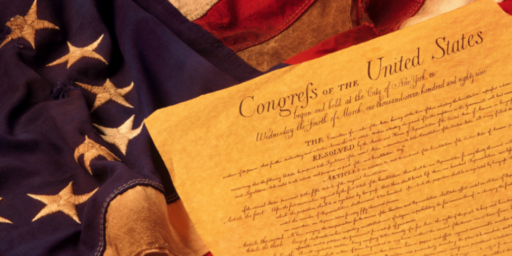

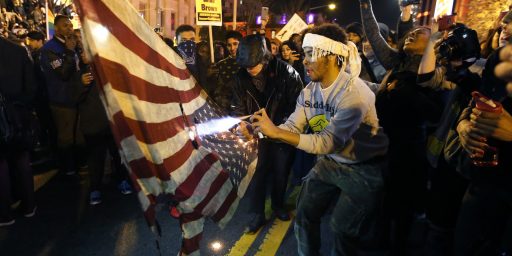
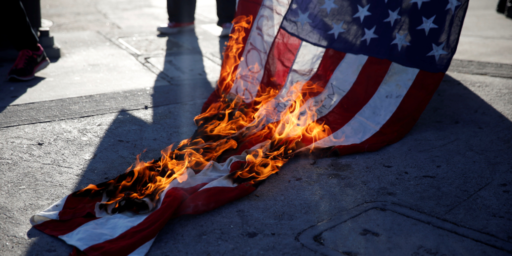
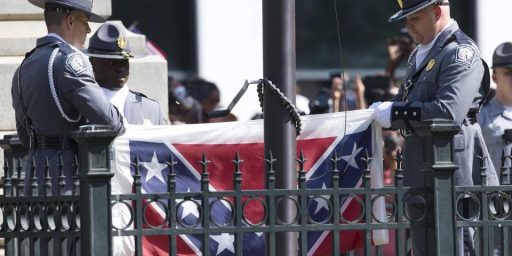
Countries and people are incredibly weird when it comes to patriotic symbols (and other symbols, too).
In Mexico, there are laws regulating the use of the flag and the national emblem on it. And until the mid 90s or so, you could be fined for singing the anthem wrong.
But no one forced you to sing the anthem or salute the flag.
I suggest that the school lawyer up and try to gather some damn solid evidence for these accusations. Here are some alternate interpretations:
“Choice to disrupt the classroom” = Asserting his rights and reasons for not reciting the pledge.
“Threats” = Telling them he could sue them for infringing his rights.
“Resisting the officer’s efforts to leave the classroom” = Asking why he had to leave when he didn’t do anything wrong.
OT…Breaking…
Bob Kraft charged with soliciting prostitutes related to human trafficking.
It’s not clear if the human chattel was brought over the unsecured border. Did he just “turn left”? Did he put blue tape over their mouths? Is he a member of MS-13?
Lot’s of unanswered questions. Maybe Dennison and Epstein know more…
@Daryl and his brother Darryl:
So…it’s not funny…but it’s funny.
My fruede is over-schadened.
@Daryl and his brother Darryl:
Was Kraft paying someone to take a knee???
@Daryl and his brother Darryl: I’m a little gobsmacked myself. The guy’s worth 6 Billion dollars, and he’s in some roadside massage parlor? WTF?
Meanwhile, a judge has ruled that Sec of Labor Alex Acosta as a Federal Prosecutor broke the law with a lenient (lenient ain’t the half of it) plea agreement with underage sex trafficing billionaire Jeffrey Epstein. And as Scott Lemieux over at LGM observes, this doesn’t necessarily make Acosta the worst person in Trump’s cabinet.
@gVOR08: Kraft is a friend of Trump’s as well. Now we can add Acosta and Kraft to the long list of upstanding Trump associates.
I pledge allegiance…
@gVOR08:
Plus…his girlfriend (Ricki Noel Lander) is already like 38 years younger than him…half his age…so it’s not like he’s out running around on a septuagenarian.
@Daryl and his brother Darryl:
“in fact held as virtual prisoners/sex workers.” Is never funny, but it is funny when some overcompensated titan of industry gets caught participating in the acquisition of forbidden fruit.
Apparently the cops have video his balls being deflated.
Ba-rump-bump.
Thanks – I’ll be here all week…tip your waitresses.
@Daryl and his brother Darryl:
“Apparently the cops have video his balls being deflated.”
Can we call this De-fellate-gate?
Is there some sort of criminal law equivalent of vexatious litigation from civil law?
@Daryl and his brother Darryl: I’m going with not funny. Sex slavery, like other slavery, not funny.
If he is convicted, sent to jail, and passed around as a prison rape toy, it would also not be funny. Poetic justice, maybe, but not from a funny poet.
(How hard is it to find a nice, independent sex-worker, who isn’t a slave? Ok, probably a little hard to be 100% sure, but lower the odds at least)
“Bong Hits 4 Jesus” seems like a political statement to me — pro drug law reform, and against the incessant attempts to put religion in every sphere of public life by treating it irreverently.
Also, it promotes sharing. It’s not a full bong, just a couple of hits.
Requiring the pledge, however, is compulsory political speech. I can see the court making a distinction, even as they have been whittling away student free speech rights, between banning political speech in schools and requiring it.
Also, the substitute teacher is an asshat.
@Franklin: And also
which transmogrified into
The substitute teacher over stepped–I have to conclude that in Florida one need not take any training in teaching to become a substitute as I know of no one who actually has the minimal training is education law required in my state for the past 40 years who would have made that error.
Additionally, the kid seems to have been looking for a fight himself. Still, the guest teacher’s reaction and actions were foolish and she shouldn’t have chosen that hill to die on. Just write him up for insubordination without getting into the argument.
But the charges come off sounding like “you’re under arrest for being uppity.” Then again, I’m not surprised at that anymore. We’re “Making America
whiteGreat Again!” these days and this kind of crap is going to continue.Bingo…apparently in 2019 some people are still supposed to know their place…how pathetic…
@Just nutha ignint cracker:
That was my thought, as well. I’m surprised they didn’t throw in charges of “spitting on the sidewalk” and “lingering with intent”.
The Pledge of Allegiance is super fascist creepy and idolatrous.
Good on that lad for being perceptive and strong-hearted, and willing to strongly assert his dissent. I heartily approve.
This is what happens with modern youth. No any patriotic teaching at schools. Students will be afraid of being Americans in the near future. It’s my pessimistic opinion. Doug, if you are interested, you can check my political and historical essays at Edu Birdie. What do you think? We can cooperate and write an article about the failed education system of the US.